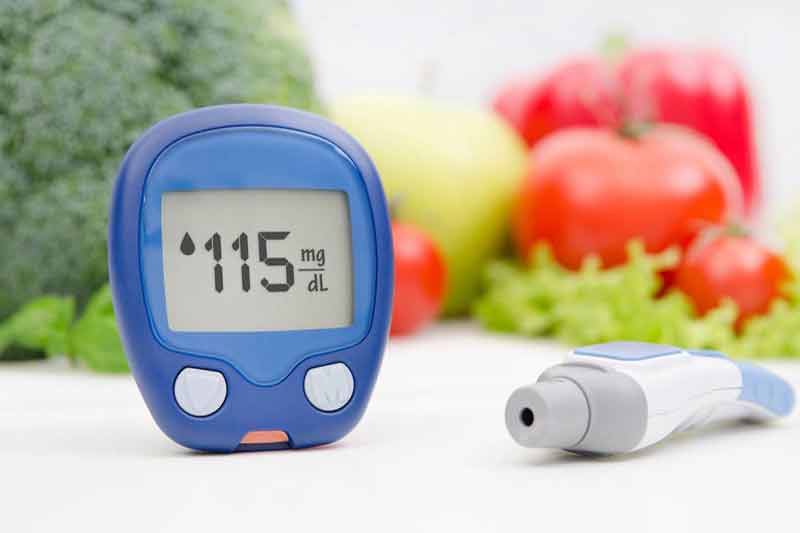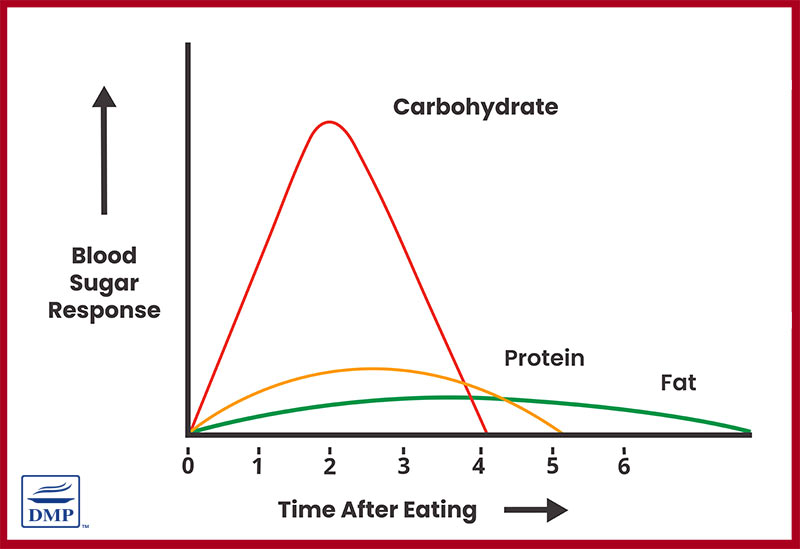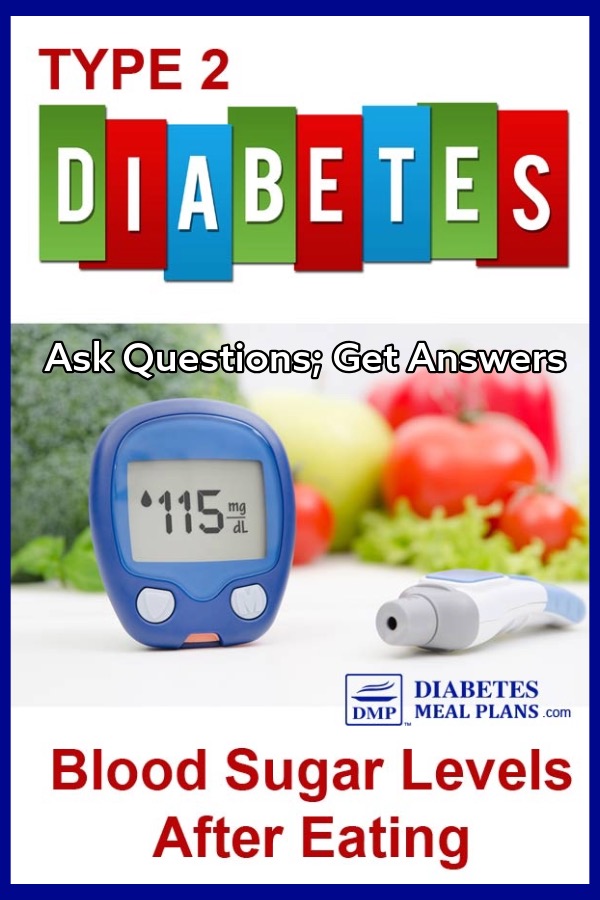Too many of the wrong foods can quickly send your blood sugar levels soaring after eating, which will in turn raise your A1c and makes it difficult to gain control over your type 2 diabetes or prediabetes.
When blood sugar or A1c run riot, you can increase your risk of developing diabetic complications such as neuropathy or cardiovascular disease – and of course, no one wants that, right? That’s why it’s important to know your numbers.
To kick off this discussion, we’ve gathered some commonly asked post-meal blood sugar questions. Make sure to join the discussion by asking your own questions in the comments below.

What level is considered high after eating?
The general recommendation is 180 mg/dL or 10.0 mmol/L, which is okay and a good start.
But ideally, your goal is to maintain blood sugar levels under 140 mg/dL (7.8 mmol/L) after a meal. Therefore, if your levels run above this on a regular basis, they would be considered high.
My blood sugar levels after eating are always different, is this normal?
This is normal because your blood sugar levels are directly impacted by what you eat!
If you’re talking about small variations in glucose levels, and you’re generally staying below the 140 mg/dL (7.8 mmol/L) threshold, then you don’t need to worry about those differences.
However, if your sugar levels are all over the place, and they are running high on a regular basis, then you need to stop and think about what you’re eating.
Carbs are the nutrient that most affect blood sugar levels, and we know lower carb eating plans are more effective at lowering A1c and blood sugar when compared to low fat diets.
So as an example: If you indulge in a slice of ‘tradional’ pizza (high carb), then you could predict (with high certainty) that your post-meal blood sugar will be much higher than had you enjoyed a Diabetes Friendly Low Carb Lasagna for dinner!
The key is you want to keep your after meal levels below 140 mg/dL (7.8 mmol/L).
If you should take your blood sugar levels 2 hrs after eating, does that mean you have to wait 2 hours after a meal before you can eat a snack, since you can’t eat a snack and then test your blood sugar?
For a true 2-hour post-meal reading, you should not snack after you finish your meal.
The 2-hour time frame is the amount of time it takes your body to digest your meal, break down the nutrients, and absorb the sugar into your cells. If you’re snacking mid-way through this 2-hour time frame then you are disrupting normal metabolism and therefore the blood sugar reading isn’t all that telling.
Make sure your meals are packed with protein and lots of healthy fat. This will help you stay fuller longer so that you don’t have the urge to snack right after a meal.
My blood sugar levels after eating are always changing and often higher than they should be. I don’t understand, how do carbohydrates affect blood sugar? Obviously it’s not just sugar.
You’re right, it’s not just sugar in foods. Like we said above: Carbs are the nutrient that most affect blood sugar levels.

Carbohydrates are the broad class of nutrient, and sugar is a subcategory of a carbohydrate. The other two subcategories of carbs are starch and fiber.
Something many people forget is that both sugar and starch break down into sugar (glucose) molecules, which can be used for cellular energy. For this reason, only counting grams of sugar isn’t enough; you need to look at the carbohydrates consumed.
Let’s talk about a few different foods so that you have a better understanding of sugar, starch, and fiber.
Sugar: Most people can identify a high sugar food – think of a candy bar or can of soda. Clearly these types of foods are best avoided by people with diabetes and prediabetes.
Starch: Rice, pasta, and potatoes are examples of foods that are high in starch. Since starch is a type of carbohydrate it also means these foods are high in carbs. None of these foods are high in added sugar, but as soon as you eat them your body will begin to break down the starch into glucose, which raises your blood sugar levels.
If your blood sugar levels are high after eating bread, oats, or rice it’s because your body is breaking down these foods into sugar. Even “healthy” grains like whole grain bread or brown rice are very high in starch, and therefore will directly raise blood sugar levels.
If you have prediabetes or type 2 diabetes you should avoid, or significantly limit, these types of high starch foods.
Fiber: Fiber is a non-digestible carbohydrate. This type of carbohydrate does not get turned into sugar, which means great things for your blood sugar levels. Vegetables are packed with fiber and most contain very little starch; hence why we recommend you include tons of non-starchy vegetables in your diet.
My blood sugar is always high at noon (198-252 (11.0 to 14.0). The only way to have normal sugar reading is to not have breakfast at all. When I have breakfast and a shot of fast acting insulin reading at noon, my levels are always over 180 (10.0). I have changed what I eat too many times that I don’t care. Any suggestions on why this is or what to do?
The most obvious thought is to look at what you’re eating for breakfast; common breakfast items like cereal or pancakes are going to spike your blood sugar much more than eggs or some plain yogurt with berries.
Another thought relates to your fasting (before breakfast) sugar level, as you could be experiencing the Dawn Phenomenon.
If you’re struggling with elevated morning sugar, then it may be beneficial to try some apple cider vinegar and cheese, or a protein-fat combo snack before bed.

Since you’re on insulin, it might be worthwhile to talk to your doctor about the particular fast acting insulin you are on. Short acting insulin starts working in 30 minutes; peaks in 2-4 hours; and lasts 4-8 hours. Your dosing may be off if you’re having trouble covering your breakfasts.
Please pin, tweet or share; then keep on reading.

My husband is 76 and has a problem with his blood sugar count, it is too high. Would his age have anything to do with it?
Age puts as at higher risk of developing issues with blood sugar control, but it doesn’t determine the ability to achieve blood sugar control and the recommended healthy ranges.
What will impact your husband’s blood sugar level is diet, exercise, and stress, so working to improve those areas is important. Excess weight can also negatively impact blood sugar levels.
Should I be monitoring my blood sugar after eating?
This is a choice and something you can discuss with your doctor because it can depend on your levels, your control, and your goals. BUT, we definitely encourage people to monitor blood sugar after eating and here’s why:
Measuring blood sugar gives you instant feedback on how you’re going on a day-to-day basis.
Many of our members have found that the more often they are able to check their sugar levels, the better their A1c is, because they are able to understand what the numbers mean and how to adjust their nutrition plan accordingly.
If you’re having difficulty gaining control over your sugar levels it can be beneficial to check more often.
Need help with lowering your after meal numbers? Join us as a member today.
We’re proud to say we’re making a real difference in people’s lives!
Gloria said: “3 months ago my A1C was 8.7 and my recent blood work showed it at 7.4. My endocrinologist was very impressed and thinks I will be at the target level by my next testing in 3 months. Just eating your meal plan for a month and seeing the results gives me motivation to continue.”


How many meals should a Type2 Diabetic have a day? Thank you.
Christine, it depends on individual factors, but most people eat 3 meals and 2-3 snacks IF they need them.
i have been prediabetic for about 15 years just got diagnosed with diabetes. My AC1 is currently at 6.5. It’s possible to reverse it without medication with a change in my diet and regular excercise
Yes Amber, it is possible, as many of our members have achieved but you need to get proactive. Read more here and consider joining us as a member as it will help you focus on the right things to turn your health around.
Since I began a low carb diet and I have nova rapid insulin before eating any carbs my sugars stay around 6. However just getting over covid and chest infection played havoc with my sugars 14 and 16 even though I wasn’t eating
Covid will do that! Hope you’re feeling better Colleen.
Are you supposed to subtract sugar alcohol, as well as fiber, from carbs listed on labels?
Hi Marcie, find some detailed info on this topic over here.
I try to eat foods with a low glycemic index. But if I do that, it is my understanding that the food is broken down to sugar more slowly, meaning I will have a high glucose level for a longer time. Is my logic correct?
Not exactly Joe. The 2-hour postprandial blood glucose measurement is a standard way to assess how your body handles glucose (sugar) after a meal, regardless of how long digestion continues. Typically, low GI foods will result in lower 2-hour postprandial levels compared to high GI foods. So essentially, lower GI helps prevent spikes and keep levels in a healthy range but your 2-hour post-meal blood glucose levels are still the key measure. If your after-meal levels are above 140 (or 7.8) 2-hours after meals then you need to make some dietary adjustments.
This morning i had cheerios with half banana, and unsweetened almond milk at 4:30 am…. I went to work. I walk horses at the racetrack. I usually walk 5 or 6 horses about 10-15 minutes each. I checked my glucose 6 hours after that cheerios meal, and my glucose was 99. Does it have to be exactly 2 hrs after eating to check blood sugar????, also, should i check my blood sugar once a day or more????????
Hi Anthony, testing 2 hours will give you a ‘postprandial’ ‘after meal’ reading and is going to show you how foods influence your blood sugar, while 6 hours after is a ‘random’ test. Most people test their fasting levels in the morning and then 2 hours after their biggest meal. Some check more often, it depends what the numbers tell you. If they are high, you might check more frequently until you get them into the healthy range.
mellitis diabetes type 2 , stage 4 Chronic kidney disease,chronic anemia, bile duck chrosis ? What is the expected BS levels for a 78 year old female?
Ruth, with multiple conditions it is best to speak to your doctor, as they may set your individual goals at a higher level such as under 180-200 mg/dL, dependent on medications you take, risk of hypoglycemia and other individual factors.
After lunch my 2Hr PP is 220.Pease suggest to reduced.
Hi Birendra, focus on nutrition and what you are eating, as it has a direct influence on your PP numbers. In particular, try to reduce the carbohydrate foods in the meal and ensure you are eating lots of vegetables (not potatoes), meats or fish etc – quality foods. Listen to this podcast here on what to eat.
My daughter is 8 years old. Her numbers lately have been higher then i like. She’s never been diagnosed with diabetes but has always been on that teetering line. 2 hrs after her meal last night it was 138 and that’s the highest it’s ever been and her fasting for that morning was 111 which had me extremely worried. I’ve never had to deal with diabetes so I know I’m not helping her as I could be. Is there any helpful educational materials out there for her an I so I can better help her?
Hi Jessica. You’re in the right place here for educational materials! 138 is still in the healthy range, but certainly you could get it lower. The best thing you can do for your daughter is focus on a healthy lower carbohydrate eating plan and teach her about healthy foods, because the foods she eats will impact her after-meal levels – see here and here to help you get started. You can also get more active with her too and that will help her blood sugar levels.
My blood sugar has been high. I have been using the British glucometer. my reading has been high as 29. I urinate alot
Check out this article for dealing with those suddenly high readings- anything over 16.6 mmol/L and you should contact your doctor for specific recommendations and to find out if it’s necessary to go to the emergency room.
In general, many of our members find a low carbohydrate diet can help them gain better control over their sugar levels. Here’s a list of best foods to pick from. Remember, long term uncontrolled blood sugar is what leads to all those nasty diabetic complications.
Thank you for all your info. I would like to know how does a non diabetic blood sugar chart look like after they eat? How high does it go or does it stay below 99? And I seem not to be able to get my morning blood sugar under 99. Stays between 112 and 105, before I go to bed it will be in the 90’s and I do have a cheese snack because when I wake up in the nite I always break into a quick sweat so I think I’m low? Yhnx so much
Hi Bonnie,
Do you have a meter to check your blood sugar? If you wake up with signs of hypoglycemia you really should be checking your blood sugar- if you are below 70mg/dL then you need to have a carbohydrate containing snack. Cheese is not an appropriate snack if your blood sugar is low.
However, in general cheese is a great snack for diabetics and can be used as a before bed snack if you are feeling hungry.
The “normal range” for people without diabetes is under 100mg/dl in the morning, and under 140mg/dL after meals. Do your best to maintain near normal sugar levels through diet, exercise, and medication as needed. Occasionally waking up around 112mg/dL is pretty decent, consider trying some apple cider vinegar with your cheese prior to bed.
I’m have been diagnosed a month ago with a reading of 366 in the hospital. My a1c was 12! They did all the necessary tests and chest X-ray to make sure all was well with me. I am now with a doctor who prescribed metformin 500 mg daily but have not taken any since I went back to my old way of eating and exercising. I broke my back and know that was no excuse for overeating but it was a long 18 month road back to walking. And diabetes runs in my dad’s family. So I had a 50/50 shot of getting it. I have been back to normal eating and exercise and in 1 month my reading today upon awakening was 109. I will check it again after eating lunch. But the last time I checked (8/9 days ago) it was 121. About 4/5 hrs after dinner, it is 77. I am going to try to keep off medication for another 2 months and see if it is normal. I was told by my doctor that the honeymoon phase is what I’m in and I can get in trouble doing this? Everything I read states it mostly pertains to type 1. But I did read type 2 can do the same with insulin? To add to the conversation, I think eating the right foods, taking all the processed food and a lot of carbs out of your daily routine will keep a1c levels down. I can’t have mine checked just yet as I know that the cells last 3 months. Exercise after lunch or dinner would add to this for me. I also lost 15 pounds!
Sandi- so far it sounds like you are on the right track!
Absolutely through diet, exercise, and weight loss (as needed) you can remain off medication and still maintain normal sugar levels. It’s only harmful if you’re sugar levels are remaining elevated- aim to stay under 140mg/dL after means; under 100mg/dL in the morning.
The honeymoon phase does go hand-in-hand with type 1 diabetics- but again, as long as your sugar levels are under good control there isn’t any harm that I can identify by doing it this way. If down the road you notice that your sugar levels are creeping up, then at that point you would want to consider adding medication.
Check out this food list if you’re looking for some guidance with diet.
Thanks so much. 🙂. I will keep on this path and check at different times. I just want to make sure all is well at different times. I did eat a bad, larger dinner last night since I wanted to see how much it would affect my levels. 2 hrs after that dinner my bg was 134 and 3 hrs after spiked to 147. Is this because it takes the “bad food” longer to spike? I have so much to learn with this. My parents just took their readings once in the am. I never knew how quickly they can change throughout the day. You are so kind to offer your advice and information on diabetes. I have been learning and keeping a log of all my readings and what I I eat and how much and when I exercise now.
That is one possible explanation, Sandi. Foods with more fiber (complex carbs) and/or fat will take longer to digest compared to “simple carbs.” This may prolong your post meal readings. Another explanation, especially since the difference isn’t that great, could just be a slight fluctuation in your meter. Keep up the great work and pick the foods that allow you to stay under 140mg/dL regularly!
Two questions. Does the 2 hours after a meal start with the first bite or the last. Also, does drinking a beverage count as eating?
Blood sugar levels should be checked 2 hours after the first bite- this is when digestion begins! Remember to aim for levels under 140mg/dl after meals.
Drinking would count as eating if the beverage contains calories/carbohydrates- items such as milk, juice, soda, or sweetened tea. (In generally, these are not foods you should be eating.) If you are consuming a no-calorie beverage such water, seltzer, black tea or black coffee then no, you would not count that as eating.
My fasting blood sugars are very high in the mornings, higher than when I go to bed, 350in the morning and 290 in the evening. I only eat a couple of pieces of bread per day, no juice, pop, or candy ever. A few crackers once in a while. I have a Humalog Mix Kwik Pen 50/50. I don’t know how much I should be taking before a meal but usally take 26 units if i’m going to have a piece or two of bread but my sugars remain high at night and in the morning even higher.
Carbohydrates are the #1 nutrient that most impact blood sugar levels- this includes bread, crackers, rice, pasta and juice. We encourage those with high blood sugar to try a low carbohydrate diet as science shows this is one of the most effective ways to improve blood glucose control. Monitor your sugar levels as you begin to choose more foods from this list– I would encourage you to eliminate the bread and crackers for the time being.
Make sure to check with your doctor about insulin dosing. ESPECIALLY, if you are going to be reducing your carbohydrate intake, then you may need to also reduce your insulin as well.
Levels vary very high during early mornings hours before even coffee. I get up very early for work. I’m on metformin in am and pm..why are my levels so high, average of 179 last 2 weeks.. my levels are slowly creeping upward
Due to changes in our hormones, high morning blood sugar is a problem for many. This article will provide a bit of guidance on how to remedy- one favorite that is effective for many of our readers is taking some apple cider vinegar and cheese prior to bed. Aim for levels under 130mg/dl in the morning!
A low carbohydrate diet can also be effective in lowering around the clock blood sugar, not just in the morning. If you have never tried this eating style, then you may want to consider trying for improved control.
I find this very true. I keep to the low carb way and don’t do the high fat. I try to find the lowest fat except for the “good” kind. I keep the same reading nightly about 4 hrs after dinner at 77. Is this an acceptable level or is it too low? I eat about 5 pecan halves and 2 Brazil nuts & a tsp of low fat cottage cheese before bed. Is there a cause for my bg to go lower at that time of night?
A reading of 77mg/dL is right on the edge of being considered low- usually under 70mg/dL is considered too low. I would encourage you to continue with your evening snack, this will ensure you stay at a happy level throughout the night and don’t drop too low.
Fat is a huge misconception these days!!! When we talk about “bad” fat versus “good” fat it’s very easy to get confused in all the misinformation- fat is actually super important for someone with diabetes. Check out this article to make sure you are making the right decisions when it comes to your fat choices- you may even currently be excluding some that are perfectly acceptable to include.
Thank you. I was a bit worried about that number. The nuts are staying on my menu in the evening. I like the Keto but don’t want the “bad” fat. Right now loving the salmon, avocado, etc. Who would have known.lol Have always used the olive oil (my dad’s Italian) in my cooking as well as salads.
I have been experimenting this week since everyone says to check what spikes your BG and how other foods lower it. It has been a bit crazy and I don’t think I would want to try this again. And then trying to limit my calories intake so I can get back down to 110.
I’m so glad you’re here to talk to and advise me. It really helps a lot.